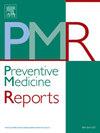Effects of loving or HABIBI educational prevention intervention on HIV/AIDS knowledge, attitude and condom use among internally displaced males from Libya: A quasi-experimental study
IF 2.4
3区 医学
Q2 PUBLIC, ENVIRONMENTAL & OCCUPATIONAL HEALTH
引用次数: 0
Abstract
Objective
Libya continues to face significant public health challenge as a result of the ongoing civil war since 2011, including HIV prevention among displaced populations. This study aims at examining the impact of the HABIBI educational intervention on HIV knowledge, attitudes, and condom use among male Internally Displaced Persons (IDP) in Libya.
Methods
A quasi-experimental study with pre-post-tests was conducted in two IDP camps in Tripoli (August–October 2023). The study was carried out in two IDP camps from different locations in Tripoli, Libya. Systematic random sampling included 30 participants in both intervention and comparison groups. Outcomes were measured at baseline, 4 weeks, and 8 weeks using Repeated Measures Chi-Square and ANOVA.
Results
The intervention group showed significant improvements in HIV knowledge from baseline (p = 0.06) to week four (p < 0.01) and week eight (p < 0.01). HIV attitudes improved by 27.59 % (p < 0.01) in the intervention group, compared to 0.68 % (p = 0.54) in the comparison group at 8 weeks. Condom attitudes were significantly higher in the intervention group at all time points (p < 0.01). Condom use increased in the intervention group over 8 weeks (p < 0.01) but not in the comparison group (p = 0.38). Barriers to condom use included trust in partners and cultural stigma around purchase.
Conclusions
The HABIBI intervention effectively improved HIV-related knowledge, attitudes, and condom use among Libyan IDPs. Addressing cultural stigma is crucial for enhancing public health interventions in conflict zones.
爱与HABIBI教育预防干预对利比亚境内流离失所男性艾滋病知识、态度和安全套使用的影响:一项准实验研究
[目标]由于2011年以来持续的内战,利比亚继续面临重大的公共卫生挑战,包括在流离失所人口中预防艾滋病毒。本研究旨在考察HABIBI教育干预对利比亚男性国内流离失所者(IDP)艾滋病知识、态度和安全套使用的影响。方法于2023年8 - 10月在的黎波里的两个国内流离失所者营地进行准实验研究。这项研究是在利比亚的黎波里两个不同地点的国内流离失所者营地进行的。系统随机抽样,干预组和对照组各30人。使用重复测量卡方和方差分析在基线、4周和8周测量结果。结果干预组从基线到第4周,HIV知识有显著提高(p = 0.06) (p <;0.01)和第8周(p <;0.01)。艾滋病态度改善27.59% (p <;干预组为0.68% (p = 0.54),对照组为0.68% (p = 0.54)。干预组在各时间点对安全套的态度均显著高于干预组(p <;0.01)。干预组的安全套使用在8周内有所增加(p <;0.01),对照组无差异(p = 0.38)。使用避孕套的障碍包括对伴侣的信任和对购买的文化耻辱感。结论HABIBI干预有效改善了利比亚境内流离失所者艾滋病相关知识、态度和安全套使用情况。消除文化耻辱感对于加强冲突地区的公共卫生干预至关重要。
本文章由计算机程序翻译,如有差异,请以英文原文为准。
求助全文
约1分钟内获得全文
求助全文
来源期刊

Preventive Medicine Reports
Medicine-Public Health, Environmental and Occupational Health
CiteScore
3.90
自引率
0.00%
发文量
353
 求助内容:
求助内容: 应助结果提醒方式:
应助结果提醒方式:


